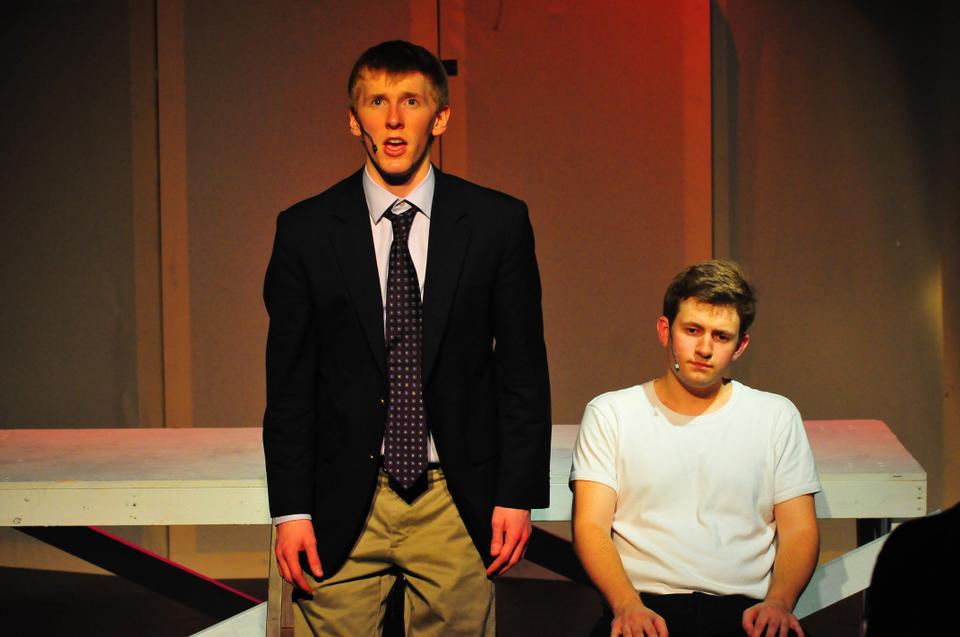
News
Progressive Labor Party Organizes Solidarity March With Harvard Yard Encampment

News
Encampment Protesters Briefly Raise 3 Palestinian Flags Over Harvard Yard

News
Mayor Wu Cancels Harvard Event After Affinity Groups Withdraw Over Emerson Encampment Police Response

News
Harvard Yard To Remain Indefinitely Closed Amid Encampment

News
HUPD Chief Says Harvard Yard Encampment is Peaceful, Defends Students’ Right to Protest
‘Boom!’ Resounds in the Adams Pool
‘tick, tick...Boom!’ explores coming- of-age anxiety with catchy songs and passionate acting.

“Now what should I do with my life?” is a question that has crossed the minds of countless people, from second-semester college seniors to starving artists to successful executives. Last week in the intimate setting of the Adams House Pool Theater, the Harvard-Radcliffe Dramatic Club put on “tick, tick...Boom!”—a self-deprecating and funny musical written by Jonathan Larson and directed by Allen J. Macleod ’14. Although the singing is sometimes lackluster, the show makes up for this with its actors’ passion and Macleod’s effective direction.
Larson is best known for writing the Pulitzer Prize-winning “RENT,” and “tick, tick...Boom!” explores many of the same themes. The musical tells the story of Jon (Adam J. Conner ’14), a struggling composer who begins to have doubts about his career as his 30th birthday approaches. As he goes about his life, he hears an incessant ticking sound in the distance that reminds him that the end of his youth is frighteningly close. Meanwhile, his girlfriend Susan (Kimberly A. Onah ’15) wants to move out of New York and start a family, and his best friend Michael (Karl Kopczynski ’15) has given up his own acting career in favor of a lucrative job at a marketing firm. The musical pays homage to the young struggling-artist lifestyle and to New York City while still critiquing the conditions of life in the 1990s. As Jon puts it, “It’s hard for people born after 1960 to be idealistic or original. We know what happens to ideals. They’re assassinated or corrupted or co-opted. It’s 1990 for God’s sake…. [It’s] conservative, complacent, obtuse, and unimaginative. Or, to put it another way: George Bush is president of the United States.”
Using just three actors to play all the parts in the show allows “tick, tick... Boom!” to burst with creative energy. Conner’s effective interpretation of Jon grounds the musical and gives it poignancy. His rendition is personable and realistic—a man who seems to be an adult but has not quite grown up, who gobbles Twinkies, and who holds down a dull job at a local diner while following his dream of becoming a major composer. The strongest parts of the musical are not its musical numbers but the scenes in which Conner, who is a Crimson business editor, speaks directly to the audience, sharing personal confessions that, because they seem genuine, generate empathy for a character who otherwise might seem unremarkable.
Though the Pool Theater space is limited in size, Macleod has his actors take full advantage of all the space available. For example, one song, which takes place in a diner, has the actors climbing on the furniture to mock over-demanding customers. Many of the songs are accentuated by the actors climbing up bleachers and using the aisle space to engage the crowd.
The musical would risk foundering if not for the passion that the actors bring to the stage. The small cast injects humor and zest into the aforementioned musical number through their characterization of the customers and wait staff. In another effective song, the cast parodies a typical couple’s fight as they sing “I feel bad that you feel bad about me feeling bad about you feeling bad about what I said about what you said about me not being able to share a feeling.” The cast also belts out an ode to sugar, and in another scene, to the luxuries of Michael’s new apartment, which has no more “noxious fumes from gas heaters that are illegal” or “climbing over sleeping people before you get out the door of your own building.” The actors seem very sure of their interpretation of Larson’s script, and this confidence allows them to effectively translate some of the show’s more abstract moments to the audience. As a whole, the musical is witty, angsty, and self-aware. However, it is clear that the actors are having fun, and that makes it enjoyable to watch. Some of the songs are forgettable, the overall production is an engaging David-and-Goliath story that pits the striving artists on one side against corporate America and the behemoth of Broadway on the other. HRDC’s latest production delivers laughs and a compelling story while leaving viewers with the uncomfortable notion that they, too, might have a clock ticking down to the day when they reach 30.
—Staff writer Ola Topczewska can be reached at atopczewska@college.harvard.edu
Want to keep up with breaking news? Subscribe to our email newsletter.
